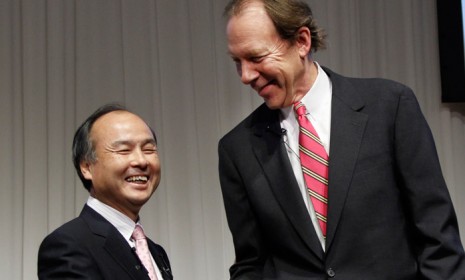The Sprint-Softbank merger: 4 takeaways
With some badly needed financial support from Japan, the U.S.' third-largest mobile carrier turns up the heat on AT&T and Verizon

A free daily email with the biggest news stories of the day – and the best features from TheWeek.com
You are now subscribed
Your newsletter sign-up was successful
Japanese telecommunications company Softbank has announced that it will purchase an ownership stake of 70 percent in Sprint, the U.S.'s third-largest mobile carrier, for $20 billion. It is the biggest-ever overseas acquisition by a Japanese company, and the latest sign of consolidation in the U.S. mobile industry, coming shortly after T-Mobile announced that it would partner with MetroPCS. Here, four takeaways from the Sprint-Softbank merger:
1. This gives Softbank a huge opportunity
"Softbank stands to gain entrance to the U.S. market and capture the growth that's largely disappeared from the oversaturated Japanese market" for cell phones, says Abram Brown at Forbes. Softbank CEO Masayoshi Son, a "risk-taker in Japan's often cautious business circles," is "betting U.S. growth can offer relief from cut-throat competition" in Japan, say Mari Saito, Tim Kelly, and Nicola Leske at Reuters. Son acknowledged that it would be a challenge to enter a new and unfamiliar market, "but not taking this challenge will be a bigger risk," he said.
The Week
Escape your echo chamber. Get the facts behind the news, plus analysis from multiple perspectives.

Sign up for The Week's Free Newsletters
From our morning news briefing to a weekly Good News Newsletter, get the best of The Week delivered directly to your inbox.
From our morning news briefing to a weekly Good News Newsletter, get the best of The Week delivered directly to your inbox.
2. Sprint gets a welcome infusion of cash
The details of the merger are so complicated that "Softbank's news release explaining it contains three flow charts, complete with dotted- and solid-line arrows to show the movement of funds and ownership," say Phred Dvorak and Kana Inagaki at The Wall Street Journal. The bottom line? Sprint "gets an immediate $8 billion cash infusion," says Eric Savitz at Forbes, which will undoubtedly help the carrier expand and improve its 4G network, pay off debts, and even purchase companies that would help it better compete with AT&T and Verizon. "In the wireless business, the bigger you are, the better off you are," says Roger Cheng at CNET.
3. AT&T and Verizon should be a little worried
"AT&T and Verizon are both obvious modest losers here; they now have a bulked up rival," says Savitz. The financial support from Softbank means Sprint can focus on improving its unlimited data plan for smartphones, which is the company's principal distinction from AT&T and Verizon (both companies recently stopped offering unlimited plans to new customers). "No other carrier offers the combination of the iPhone and the unlimited plan," says Cheng, and Sprint can take advantage of that unique offering as long as it can expand its 4G network to more markets.
A free daily email with the biggest news stories of the day – and the best features from TheWeek.com
4. Consumers win
"At this time last year, industry watchers were bracing for a telecom sector 'duopoly' between AT&T and Verizon, as virtually every other carrier struggled to stay afloat in the capital-intensive business of building national networks to handle smartphone data loads," says Antoine Gara at The Street. A viable number-three carrier, as well as the recent merger between T-Mobile and MetroPCS, means "the telecom sector is poised for a resurgence of competition" that will result in lower prices and better options for consumers.
Sources: CNET, Forbes (2), Reuters, The Street, The Wall Street Journal
-
 Why is the Trump administration talking about ‘Western civilization’?
Why is the Trump administration talking about ‘Western civilization’?Talking Points Rubio says Europe, US bonded by religion and ancestry
-
 Quentin Deranque: a student’s death energizes the French far right
Quentin Deranque: a student’s death energizes the French far rightIN THE SPOTLIGHT Reactions to the violent killing of an ultra-conservative activist offer a glimpse at the culture wars roiling France ahead of next year’s elections.
-
 Secured vs. unsecured loans: how do they differ and which is better?
Secured vs. unsecured loans: how do they differ and which is better?the explainer They are distinguished by the level of risk and the inclusion of collateral